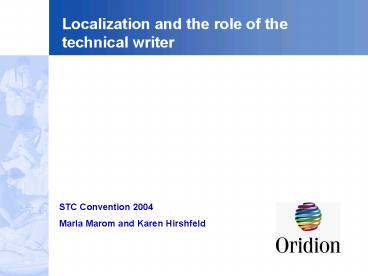Localization a definition - PowerPoint PPT Presentation
1 / 20
Title:
Localization a definition
Description:
STC Convention 2004. Marla Marom and Karen Hirshfeld ... Kohl, John R. 'Improving Translatability and readability with syntactic cues. ... – PowerPoint PPT presentation
Number of Views:90
Avg rating:3.0/5.0
Title: Localization a definition
1
(No Transcript)
2
Localization and the technical writer
- Localization a definition
- Key reasons for localizing a product
- Preparing documentation for translation
- Working with a translation company
- QA
- Localization and the future
3
Localization vs. Globalization
- Localization makes our documentation appropriate
for a particular locale - Globalization makes our documentation appropriate
globally - worldwide
4
Why do we need to Localize ?
- Marketing needs
- Regulatory requirements
5
Localization What is it?
- Linguistic issues
- Technical issues
6
Localization Why does it concern me?
- Technical writers are the best choice to spur
head the localization process with regard to
translation
7
Localization the challenge of the technical
writer
- Produce localized documentation that remains true
to the content and graphic intent of the source - Create documentation that can be easily localized
8
How do I choose a translation company?
- Individual translators
- Translation agency
9
How do I choose a translation company?
- Local vs. international firm
- Tools
- Experience
- Trust
- Cost
10
When can I start translating?
- You should not begin the translation until
everyone and their boss and their mother and
uncles approves the text - Paula Stern, Writepoint
11
Writing for localization
- Glossary
- Style Guide
- Authoring Tools
- Template Design
- Graphics
- Simplified English
12
Writing for localization - Glossary
- Create a glossary of terms/phrases
- Get company approval of terms and definitions
- List terms not to be translated
13
Writing for localization Style guide
- Paper size
- Weights and measures
- Fonts
- Punctuation styles for different languages
- Country specific requirements
14
Writing for localization Authoring tools
- FrameMaker
- Word
- Other (Quark, PageMaker)
15
Writing for localization Template design
- Management of space
- Increase white space
- Exploit software utilities
- line spacing
- paragraph leading
- character kerning
16
Writing for localization Graphics
- Use icons with care
- Avoid text embedded in graphics
17
Writing for translations
- Be consistent
- Whenever possible use the active voice
- Use simple sentences rather than complex
- Use the simplest verb forms
- Use commas aggressively
- Avoid colloquialisms
- Avoid words that have opposite meanings
- Avoid humor
- Avoid wordplay
18
QA Getting it right
- Check it yourself
- Have a local distributor to review it
19
Looking forward
- The wordless manual?
20
References
- Balchunas, John. Subsidiary reviews in the
European Union. Intercomm, May 2003 - Hoft, Nancy. International Technical
Communication How to Export Information about
High Technology. John Wiley Sons, 1996 - Kohl, John R. Improving Translatability and
readability with syntactic cues. Technical
Communication. May 1999. - Locke, Nancy A. Graphic design with the world in
mind. Intercom, May 2003 - Maaks, Betsy M. Translation stumbling blocks.
Intercom, May 2003 - Postus, Whitney B. and Kvaavik Kaarina. Is your
documentation translation ready? Intercom, May
2001. - Walmer, Daphner. One companys efforts tob
improve translation and localization. Technical
Communication. May 1999 - LISA The localization industry primer. 2nd
edition. http//www.lisa.org































